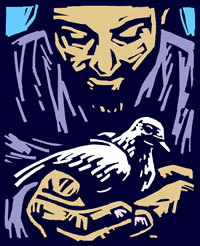
Baptism of the Lord Year A
Our Christmas season’s celebration ends with the theme of ‘Epiphany’, or ‘Manifestation’ – reminding us that in the coming of the eternal Son, ‘the goodness and loving kindness of God our Saviour has appeared among us’ (Titus 3:4). During the final week of Christmas time, the liturgy recalls three moments of ‘manifestation’ – to the Magi, representing the peoples of the world; through the ‘first sign’ worked by Jesus as the marriage at Cana; and in the dramatic moment when Jesus was baptised by John.
It is not surprising that Christ’s entering into the waters of repentance – a fact referred to all four gospels – was difficult for the first Christian believers to square with their faith in Jesus as ‘the Lord’ himself, author of all holiness. Matthew echoes this bewilderment in the hesitations of John the Baptist. In the reply of Jesus – that this is something ‘for the time being’, in order that ‘all righteousness may be fulfilled’ – Matthew summarises the essential theme of his gospel. He is writing, as we know, for an audience with a Jewish background. In Jesus, the true spirit of Israel (‘righteousness’) will recognise the ‘fulfilment’ of all that was foreshadowed and promised in the Old Testament.
The Paschal Mystery has brought home to those Matthew is writing for the full significance of this moment that was the immediate prelude to the public life of Jesus - when he went down with the crowds into the waters of repentance. Our gospel passage expresses the fruits of their prayerful reflection. It was something appropriate ‘for the time being’, as Jesus showed that he identified with the traditions of his people, giving honour to the last prophet of old Israel (see Mt 11); but at that very moment the new order of fulfilment was being inaugurated by the words of the eternal Father himself. ‘This is my Son, the Beloved’ – these words echoed the theme whereby the kings of the Davidic line were seen as adopted ‘sons of God’: called to rule in God’s stead (see Pss 2, 110 etc). The words, ‘My favour rests on him’, are an echo of today’s first reading from Isaiah, in which the Lord describes his ‘Servant’ as ‘my chosen one in whom my soul delights’. This passage is one of the Servant Songs, as they are called, written at the time of the Exile, pointing to the hopes that old Israel should cling to in their time of humiliation – hopes to be realised through someone who would give expression to all that Israel was called to be. In other words, Matthew’s community is called to recognize - in the Risen Lord of the Paschal Mystery - the roles of Messiah-king and Suffering Servant. What is more, looking back they can recognise that these roles were already foreshadowed in his baptism. The baptism of Jesus in the Jordan was a foreshadowing of his ‘baptism’, as he called what lay ahead of him. In the greatest of the Servant Songs we are told, ‘ours were the sufferings he was bearing, ours the sorrows he was carrying’ (Is 53). We share in Christ’s mystery by being baptised in the name of the Trinity. Just as the Father, Son and Spirit were to be the great protagonists in the drama of the Paschal Mystery, so too they were present in this moment of anticipation on the banks of the Jordan.
John Thornhill sm

